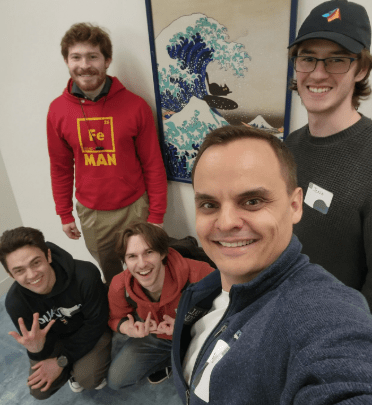June 6, 2025
Vlad Gaylun ’25, a graduate of the MAM program, participated in a weekend-long competition that connected Yale students to local leaders in quantum computing.
As the sun rose over Yale University on a Sunday morning in April, our team felt nervous, exhausted, and excited. After a long weekend with no sleep and lots of problem-solving, we were thrilled to hear our names called as winners at the YQuantum 2025 hackathon, where we secured third place in the Grand Prize category among nearly 80 teams from around the world. It was a moment of joy, pride, and validation for the effort we had all put in.
YQuantum is Yale’s annual quantum computing hackathon, a weekend-long event that brings together students, researchers, and professionals to solve real-world challenges using quantum computing, a branch of computer science that uses the principles of quantum physics to address complex problems. This year’s event saw 700 registrants from 29 countries and 104 universities. Teams of three to five students picked one of nine sponsored challenge tracks—three “advancement” tracks that pushed quantum algorithms forward and six “application” tracks tackling real-world problems, such as insurance risk or wildfire response—and then sprinted through a 24-hour build window before capping it all with a short demo to a panel of industry judges. It was fast-paced, collaborative, and full of creative energy.
I entered the competition to explore how quantum computing can be applied in the business world, especially in finance and risk management. Before arriving at Yale SOM, I spent a transformative year at the Asia School of Business in Kuala Lumpur, where the action-learning culture taught me to dive head-first into messy, high-stakes projects. That same roll-up-your-sleeves mindset made a quantum hackathon feel like home. As a SOM student with a strong interest in emerging technologies, I wanted to go beyond the classroom and apply what I’d been learning in a real-world setting. Fresh from Professor Steven Girvin’s mind-bending course Quantum Information Processing and Communication, I was ready to put those insights to the test.
Our challenge, sponsored by The Hartford and Capgemini, asked us to address a practical question: How can quantum computing reduce risk in large, tightly correlated insurance portfolios? Classical optimizers struggle with this combinatorial complexity. Although today’s quantum hardware still has limited qubits and noisy operations—and real-world insurance datasets tend to be large and messy—we found a path forward. By combining smarter algorithms with strategic problem partitioning, we demonstrated that near-term quantum resources can already deliver tangible value to insurance risk management. By working around current limitations, we were able to showcase how quantum computing can already start delivering business value, especially in fields like insurance where risk and complexity go hand-in-hand.
Through whirlwind networking sessions organized by the hackathon, I formed a team with undergraduate students from several universities: Jesse Webb of Louisiana Tech University; Jesse Dance of Purdue University; Marlon Jost of Northeastern University; and Andrew Maciejunes of Old Dominion University. A few message exchanges and a late-night Zoom call convinced us we had the right mix of expertise, strategy, and business savvy to succeed in the competition. I contributed by keeping our workflow moving, brainstorming solutions, helping bridge technical ideas with business needs, and “vibe coding” our prototype. We really operated as a unit, constantly building on each other’s thoughts.
The hackathon’s greatest dividend wasn’t the trophy—it was the relationships forged in that whirlwind weekend. YQuantum Hackathon founder Pranet Sharma and Yale Quantum Institute managing director Florian Carle set the tone, curating an environment where experimentation felt effortless. Conversations with the teams at leading companies in the field, including Rigetti, QuEra, and QuantumCT, turned abstract ideas into a shared roadmap for what near-term quantum can achieve. The weekend including mentoring from experts from Capgemini and The Hartford, and I left every session feeling challenged and championed. Their questions sharpened our thinking, and the connections we made are the real prize I’m taking forward.
Looking back, I can see how this experience pulled together everything I’ve been learning at SOM. An event that connects physics, business, and technology in one fast-moving challenge is a great example of Yale’s cross-disciplinary approach in action. The hackathon helped me grow as a problem-solver and opened my eyes to new directions I might want to explore. If you’re a current or future SOM student interested in tech, finance, or anything cutting-edge, I highly recommend jumping into something like YQuantum. You don’t need to be an expert—just curious, open, and ready to learn from others.
Originally published by Yale School of Management.





